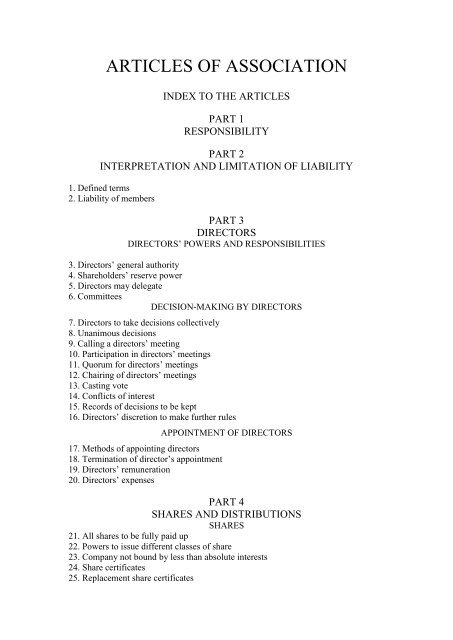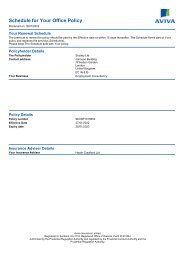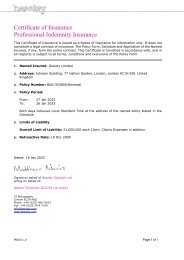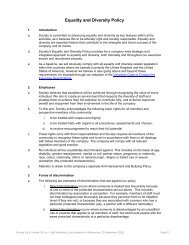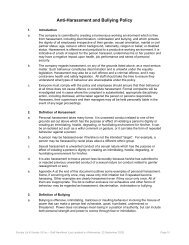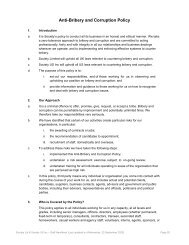Society's Artciles of Association
Create successful ePaper yourself
Turn your PDF publications into a flip-book with our unique Google optimized e-Paper software.
ARTICLES OF ASSOCIATION<br />
INDEX TO THE ARTICLES<br />
PART 1<br />
RESPONSIBILITY<br />
PART 2<br />
INTERPRETATION AND LIMITATION OF LIABILITY<br />
1. Defined terms<br />
2. Liability <strong>of</strong> members<br />
PART 3<br />
DIRECTORS<br />
DIRECTORS’ POWERS AND RESPONSIBILITIES<br />
3. Directors’ general authority<br />
4. Shareholders’ reserve power<br />
5. Directors may delegate<br />
6. Committees<br />
DECISION-MAKING BY DIRECTORS<br />
7. Directors to take decisions collectively<br />
8. Unanimous decisions<br />
9. Calling a directors’ meeting<br />
10. Participation in directors’ meetings<br />
11. Quorum for directors’ meetings<br />
12. Chairing <strong>of</strong> directors’ meetings<br />
13. Casting vote<br />
14. Conflicts <strong>of</strong> interest<br />
15. Records <strong>of</strong> decisions to be kept<br />
16. Directors’ discretion to make further rules<br />
17. Methods <strong>of</strong> appointing directors<br />
18. Termination <strong>of</strong> director’s appointment<br />
19. Directors’ remuneration<br />
20. Directors’ expenses<br />
APPOINTMENT OF DIRECTORS<br />
PART 4<br />
SHARES AND DISTRIBUTIONS<br />
SHARES<br />
21. All shares to be fully paid up<br />
22. Powers to issue different classes <strong>of</strong> share<br />
23. Company not bound by less than absolute interests<br />
24. Share certificates<br />
25. Replacement share certificates
26. Share transfers<br />
27. Transmission <strong>of</strong> shares<br />
28. Exercise <strong>of</strong> transmittees’ rights<br />
29. Transmittees bound by prior notices<br />
DIVIDENDS AND OTHER DISTRIBUTIONS<br />
30. Procedure for declaring dividends<br />
31. Payment <strong>of</strong> dividends and other distributions<br />
32. No interest on distributions<br />
33. Unclaimed distributions<br />
34. Non-cash distributions<br />
35. Waiver <strong>of</strong> distributions<br />
CAPITALISATION OF PROFITS<br />
36. Authority to capitalise and appropriation <strong>of</strong> capitalised sums<br />
PART 5<br />
DECISION-MAKING BY SHAREHOLDERS<br />
ORGANISATION OF GENERAL MEETINGS<br />
37. Attendance and speaking at general meetings<br />
38. Quorum for general meetings<br />
39. Chairing general meetings<br />
40. Attendance and speaking by directors and non-shareholders<br />
41. Adjournment<br />
VOTING AT GENERAL MEETINGS<br />
42. Voting: general<br />
43. Errors and disputes<br />
44. Poll votes<br />
45. Content <strong>of</strong> proxy notices<br />
46. Delivery <strong>of</strong> proxy notices<br />
47. Amendments to resolutions<br />
PART 6<br />
ADMINISTRATIVE ARRANGEMENTS<br />
48. Means <strong>of</strong> communication to be used<br />
49. Company seals<br />
50. No right to inspect accounts and other records<br />
51. Provision for employees on cessation <strong>of</strong> business<br />
52. Indemnity<br />
53. Insurance<br />
DIRECTORS’ INDEMNITY AND INSURANCE
PART 1<br />
RESPONSIBILITY<br />
The purposes <strong>of</strong> the Company are to promote the success <strong>of</strong> the Company for the<br />
benefit <strong>of</strong> its members as a whole and, through its business and operations, to have a<br />
material positive impact on society and the environment, taken as a whole.<br />
A Director shall have regard (amongst other matters) to:<br />
a. the likely consequences <strong>of</strong> any decision in the long term,<br />
b. the interests <strong>of</strong> the Company's employees,<br />
c. the need to foster the Company's business relationships with suppliers, customers<br />
and others,<br />
d. the impact <strong>of</strong> the Company's operations on the community and the environment,<br />
e. the desirability <strong>of</strong> the Company maintaining a reputation for high standards <strong>of</strong><br />
business conduct, and<br />
f. the need to act fairly as between members <strong>of</strong> the Company,<br />
(together, the matters referred to above shall be defined for the purposes <strong>of</strong> this<br />
Article as the "Stakeholder Interests").<br />
For the purposes <strong>of</strong> a Director’s duty to act in the way he or she considers, in good<br />
faith, most likely to promote the success <strong>of</strong> the Company, a Director shall not be<br />
required to regard the benefit <strong>of</strong> any particular Stakeholder Interest or group <strong>of</strong><br />
Stakeholder Interests as more important than any other.<br />
Nothing in this Article express or implied, is intended to or shall create or grant any<br />
right or any cause <strong>of</strong> action to, by or for any person (other than the Company).<br />
The Directors <strong>of</strong> the Company shall for each financial year <strong>of</strong> the Company prepare a<br />
strategic report as if sections 414A(1) and 414C <strong>of</strong> the Companies Act 2006 (as in<br />
force at the date <strong>of</strong> adoption <strong>of</strong> these Articles) applies to the Company whether or not<br />
they would be required to do so otherwise than by this Article.
PART 2<br />
INTERPRETATION AND LIMITATION OF LIABILITY<br />
Defined terms<br />
1. In the articles, unless the context requires otherwise—<br />
“articles” means the company’s articles <strong>of</strong> association;<br />
“bankruptcy” includes individual insolvency proceedings in a jurisdiction other<br />
than England and Wales or Northern Ireland which have an effect similar to that<br />
<strong>of</strong> bankruptcy;<br />
“chairman” has the meaning given in article 12;<br />
“chairman <strong>of</strong> the meeting” has the meaning given in article 39;<br />
“Companies Acts” means the Companies Acts (as defined in section 2 <strong>of</strong> the<br />
Companies Act 2006), in so far as they apply to the company;<br />
“director” means a director <strong>of</strong> the company, and includes any person occupying<br />
the position <strong>of</strong> director, by whatever name called;<br />
“distribution recipient” has the meaning given in article 31;<br />
“document” includes, unless otherwise specified, any document sent or supplied<br />
in electronic form;<br />
“electronic form” has the meaning given in section 1168 <strong>of</strong> the Companies Act<br />
2006;<br />
“fully paid” in relation to a share, means that the nominal value and any premium<br />
to be paid to the company in respect <strong>of</strong> that share have been paid to the company;<br />
“hard copy form” has the meaning given in section 1168 <strong>of</strong> the Companies Act<br />
2006;<br />
“holder” in relation to shares means the person whose name is entered in the<br />
register <strong>of</strong><br />
members as the holder <strong>of</strong> the shares;<br />
“instrument” means a document in hard copy form;<br />
“ordinary resolution” has the meaning given in section 282 <strong>of</strong> the Companies Act<br />
2006;<br />
“paid” means paid or credited as paid;<br />
“participate”, in relation to a directors’ meeting, has the meaning given in article<br />
10;<br />
“proxy notice” has the meaning given in article 45;
“shareholder” means a person who is the holder <strong>of</strong> a share;<br />
“shares” means shares in the company;<br />
“special resolution” has the meaning given in section 283 <strong>of</strong> the Companies Act<br />
2006;<br />
“subsidiary” has the meaning given in section 1159 <strong>of</strong> the Companies Act 2006;<br />
“transmittee” means a person entitled to a share by reason <strong>of</strong> the death or<br />
bankruptcy <strong>of</strong> a<br />
shareholder or otherwise by operation <strong>of</strong> law; and<br />
“writing” means the representation or reproduction <strong>of</strong> words, symbols or other<br />
information in a visible form by any method or combination <strong>of</strong> methods, whether<br />
sent or supplied in electronic form or otherwise.<br />
Unless the context otherwise requires, other words or expressions contained in these<br />
articles bear the same meaning as in the Companies Act 2006 as in force on the date<br />
when these articles become binding on the company.<br />
Liability <strong>of</strong> members<br />
2. The liability <strong>of</strong> the members is limited to the amount, if any, unpaid on the<br />
shares held by them.<br />
PART 3<br />
DIRECTORS<br />
DIRECTORS’ POWERS AND RESPONSIBILITIES<br />
Directors’ general authority<br />
3. Subject to the articles, the directors are responsible for the management <strong>of</strong> the<br />
company’s business, for which purpose they may exercise all the powers <strong>of</strong> the<br />
company.<br />
Shareholders’ reserve power<br />
4.—(1) The shareholders may, by special resolution, direct the directors to take, or<br />
refrain from taking, specified action.<br />
(2) No such special resolution invalidates anything which the directors have done<br />
before the passing <strong>of</strong> the resolution.<br />
Directors may delegate<br />
5.—(1) Subject to the articles, the directors may delegate any <strong>of</strong> the powers which are<br />
conferred on them under the articles—<br />
(a) to such person or committee;<br />
(b) by such means (including by power <strong>of</strong> attorney);
(c) to such an extent;<br />
(d) in relation to such matters or territories; and<br />
(e) on such terms and conditions;<br />
as they think fit.<br />
(2) If the directors so specify, any such delegation may authorise further delegation <strong>of</strong><br />
the<br />
directors’ powers by any person to whom they are delegated.<br />
(3) The directors may revoke any delegation in whole or part, or alter its terms and<br />
conditions.<br />
Committees<br />
6.—(1) Committees to which the directors delegate any <strong>of</strong> their powers must follow<br />
procedures which are based as far as they are applicable on those provisions <strong>of</strong> the<br />
articles which govern the taking <strong>of</strong> decisions by directors.<br />
(2) The directors may make rules <strong>of</strong> procedure for all or any committees, which<br />
prevail over rules derived from the articles if they are not consistent with them.<br />
Directors to take decisions collectively<br />
DECISION-MAKING BY DIRECTORS<br />
7.—(1) The general rule about decision-making by directors is that any decision <strong>of</strong> the<br />
directors must be either a majority decision at a meeting or a decision taken in<br />
accordance with article 8.<br />
(2) If—<br />
(a) the company only has one director, and<br />
(b) no provision <strong>of</strong> the articles requires it to have more than one director,<br />
the general rule does not apply, and the director may take decisions without regard to<br />
any <strong>of</strong> the provisions <strong>of</strong> the articles relating to directors’ decision-making.<br />
Unanimous decisions<br />
8.—(1) A decision <strong>of</strong> the directors is taken in accordance with this article when all<br />
eligible directors indicate to each other by any means that they share a common view<br />
on a matter.<br />
(2) Such a decision may take the form <strong>of</strong> a resolution in writing, copies <strong>of</strong> which have<br />
been signed by each eligible director or to which each eligible director has otherwise<br />
indicated agreement in writing.<br />
(3) References in this article to eligible directors are to directors who would have been<br />
entitled to vote on the matter had it been proposed as a resolution at a directors’<br />
meeting.<br />
(4) A decision may not be taken in accordance with this article if the eligible directors<br />
would not have formed a quorum at such a meeting.<br />
Calling a directors’ meeting<br />
9.—(1) Any director may call a directors’ meeting by giving notice <strong>of</strong> the meeting to<br />
the<br />
directors or by authorising the company secretary (if any) to give such notice.
(2) Notice <strong>of</strong> any directors’ meeting must indicate—<br />
(a) its proposed date and time;<br />
(b) where it is to take place; and<br />
(c) if it is anticipated that directors participating in the meeting will not be in the<br />
same place, how it is proposed that they should communicate with each other<br />
during the meeting.<br />
(3) Notice <strong>of</strong> a directors’ meeting must be given to each director, but need not be in<br />
writing.<br />
(4) Notice <strong>of</strong> a directors’ meeting need not be given to directors who waive their<br />
entitlement to notice <strong>of</strong> that meeting, by giving notice to that effect to the company<br />
not more than 7 days after the date on which the meeting is held. Where such notice is<br />
given after the meeting has been held, that does not affect the validity <strong>of</strong> the meeting,<br />
or <strong>of</strong> any business conducted at it.<br />
Participation in directors’ meetings<br />
10.—(1) Subject to the articles, directors participate in a directors’ meeting, or part <strong>of</strong><br />
a<br />
directors’ meeting, when—<br />
(a) the meeting has been called and takes place in accordance with the articles,<br />
and<br />
(b) they can each communicate to the others any information or opinions they<br />
have on any particular item <strong>of</strong> the business <strong>of</strong> the meeting.<br />
(2) In determining whether directors are participating in a directors’ meeting, it is<br />
irrelevant where any director is or how they communicate with each other.<br />
(3) If all the directors participating in a meeting are not in the same place, they may<br />
decide that the meeting is to be treated as taking place wherever any <strong>of</strong> them is.<br />
Quorum for directors’ meetings<br />
11.—(1) At a directors’ meeting, unless a quorum is participating, no proposal is to be<br />
voted on, except a proposal to call another meeting.<br />
(2) The quorum for directors’ meetings may be fixed from time to time by a decision<br />
<strong>of</strong> the directors, but it must never be less than two, and unless otherwise fixed it is<br />
two.<br />
(3) If the total number <strong>of</strong> directors for the time being is less than the quorum required,<br />
the<br />
directors must not take any decision other than a decision—<br />
(a) to appoint further directors, or<br />
(b) to call a general meeting so as to enable the shareholders to appoint further<br />
directors.<br />
Chairing <strong>of</strong> directors’ meetings<br />
12.—(1) The directors may appoint a director to chair their meetings.<br />
(2) The person so appointed for the time being is known as the chairman.<br />
(3) The directors may terminate the chairman’s appointment at any time.<br />
(4) If the chairman is not participating in a directors’ meeting within ten minutes <strong>of</strong><br />
the time at which it was to start, the participating directors must appoint one <strong>of</strong><br />
themselves to chair it.
Casting vote<br />
13.—(1) If the numbers <strong>of</strong> votes for and against a proposal are equal, the chairman or<br />
other director chairing the meeting has a casting vote.<br />
(2) But this does not apply if, in accordance with the articles, the chairman or other<br />
director is not to be counted as participating in the decision-making process for<br />
quorum or voting purposes.<br />
Conflicts <strong>of</strong> interest<br />
14.—(1) If a proposed decision <strong>of</strong> the directors is concerned with an actual or<br />
proposed<br />
transaction or arrangement with the company in which a director is interested, that<br />
director is not to be counted as participating in the decision-making process for<br />
quorum or voting purposes.<br />
(2) But if paragraph (3) applies, a director who is interested in an actual or proposed<br />
transaction or arrangement with the company is to be counted as participating in the<br />
decision-making process for quorum and voting purposes.<br />
(3) This paragraph applies when—<br />
(a) the company by ordinary resolution disapplies the provision <strong>of</strong> the articles<br />
which would otherwise prevent a director from being counted as participating in<br />
the decision-making process;<br />
(b) the director’s interest cannot reasonably be regarded as likely to give rise to<br />
a conflict <strong>of</strong> interest; or<br />
(c) the director’s conflict <strong>of</strong> interest arises from a permitted cause.<br />
(4) For the purposes <strong>of</strong> this article, the following are permitted causes—<br />
(a) a guarantee given, or to be given, by or to a director in respect <strong>of</strong> an<br />
obligation incurred by or on behalf <strong>of</strong> the company or any <strong>of</strong> its subsidiaries;<br />
(b) subscription, or an agreement to subscribe, for shares or other securities <strong>of</strong><br />
the company or any <strong>of</strong> its subsidiaries, or to underwrite, sub-underwrite, or<br />
guarantee subscription for any such shares or securities; and<br />
(c) arrangements pursuant to which benefits are made available to employees<br />
and directors or former employees and directors <strong>of</strong> the company or any <strong>of</strong> its<br />
subsidiaries which do not provide special benefits for directors or former<br />
directors.<br />
(5) For the purposes <strong>of</strong> this article, references to proposed decisions and decisionmaking<br />
processes include any directors’ meeting or part <strong>of</strong> a directors’ meeting.<br />
(6) Subject to paragraph (7), if a question arises at a meeting <strong>of</strong> directors or <strong>of</strong> a<br />
committee <strong>of</strong> directors as to the right <strong>of</strong> a director to participate in the meeting (or part<br />
<strong>of</strong> the meeting) for voting or quorum purposes, the question may, before the<br />
conclusion <strong>of</strong> the meeting, be referred to the chairman whose ruling in relation to any<br />
director other than the chairman is to be final and conclusive.<br />
(7) If any question as to the right to participate in the meeting (or part <strong>of</strong> the meeting)<br />
should arise in respect <strong>of</strong> the chairman, the question is to be decided by a decision <strong>of</strong><br />
the directors at that meeting, for which purpose the chairman is not to be counted as<br />
participating in the meeting (or that part <strong>of</strong> the meeting) for voting or quorum<br />
purposes.
Records <strong>of</strong> decisions to be kept<br />
15. The directors must ensure that the company keeps a record, in writing, for at least<br />
10 years from the date <strong>of</strong> the decision recorded, <strong>of</strong> every unanimous or majority<br />
decision taken by the directors.<br />
Directors’ discretion to make further rules<br />
16. Subject to the articles, the directors may make any rule which they think fit about<br />
how they take decisions, and about how such rules are to be recorded or<br />
communicated to directors.<br />
Methods <strong>of</strong> appointing directors<br />
APPOINTMENT OF DIRECTORS<br />
17.—(1) Any person who is willing to act as a director, and is permitted by law to do<br />
so, may be appointed to be a director—<br />
(a) by ordinary resolution, or<br />
(b) by a decision <strong>of</strong> the directors.<br />
(2) In any case where, as a result <strong>of</strong> death, the company has no shareholders and no<br />
directors, the personal representatives <strong>of</strong> the last shareholder to have died have the<br />
right, by notice in writing, to appoint a person to be a director.<br />
(3) For the purposes <strong>of</strong> paragraph (2), where 2 or more shareholders die in<br />
circumstances<br />
rendering it uncertain who was the last to die, a younger shareholder is deemed to<br />
have survived an older shareholder.<br />
Termination <strong>of</strong> director’s appointment<br />
18. A person ceases to be a director as soon as—<br />
(a) that person ceases to be a director by virtue <strong>of</strong> any provision <strong>of</strong> the Companies<br />
Act 2006 or is prohibited from being a director by law;<br />
(b) a bankruptcy order is made against that person;<br />
(c) a composition is made with that person’s creditors generally in satisfaction <strong>of</strong><br />
that<br />
person’s debts;<br />
(d) a registered medical practitioner who is treating that person gives a written<br />
opinion to the company stating that that person has become physically or<br />
mentally incapable <strong>of</strong> acting as a director and may remain so for more than three<br />
months;<br />
(e) [paragraph omitted pursuant to The Mental Health (Discrimination) Act<br />
2013]<br />
(f) notification is received by the company from the director that the director is<br />
resigning from <strong>of</strong>fice, and such resignation has taken effect in accordance with its<br />
terms.<br />
Directors’ remuneration
19.—(1) Directors may undertake any services for the company that the directors<br />
decide.<br />
(2) Directors are entitled to such remuneration as the directors determine—<br />
(a) for their services to the company as directors, and<br />
(b) for any other service which they undertake for the company.<br />
(3) Subject to the articles, a director’s remuneration may—<br />
(a) take any form, and<br />
(b) include any arrangements in connection with the payment <strong>of</strong> a pension,<br />
allowance or gratuity, or any death, sickness or disability benefits, to or in respect<br />
<strong>of</strong> that director.<br />
(4) Unless the directors decide otherwise, directors’ remuneration accrues from day to<br />
day.<br />
(5) Unless the directors decide otherwise, directors are not accountable to the<br />
company for any remuneration which they receive as directors or other <strong>of</strong>ficers or<br />
employees <strong>of</strong> the company’s subsidiaries or <strong>of</strong> any other body corporate in which the<br />
company is interested.<br />
Directors’ expenses<br />
20. The company may pay any reasonable expenses which the directors properly incur<br />
in<br />
connection with their attendance at—<br />
(a) meetings <strong>of</strong> directors or committees <strong>of</strong> directors,<br />
(b) general meetings, or<br />
(c) separate meetings <strong>of</strong> the holders <strong>of</strong> any class <strong>of</strong> shares or <strong>of</strong> debentures <strong>of</strong> the<br />
company, or otherwise in connection with the exercise <strong>of</strong> their powers and the<br />
discharge <strong>of</strong> their responsibilities in relation to the company.<br />
PART 4<br />
SHARES AND DISTRIBUTIONS<br />
SHARES<br />
All shares to be fully paid up<br />
21.—(1) No share is to be issued for less than the aggregate <strong>of</strong> its nominal value and<br />
any<br />
premium to be paid to the company in consideration for its issue.<br />
(2) This does not apply to shares taken on the formation <strong>of</strong> the company by the<br />
subscribers to the company’s memorandum.<br />
Powers to issue different classes <strong>of</strong> share<br />
22.—(1) Subject to the articles, but without prejudice to the rights attached to any<br />
existing share, the company may issue shares with such rights or restrictions as may<br />
be determined by ordinary resolution.
(2) The company may issue shares which are to be redeemed, or are liable to be<br />
redeemed at the option <strong>of</strong> the company or the holder, and the directors may determine<br />
the terms, conditions and manner <strong>of</strong> redemption <strong>of</strong> any such shares.<br />
Company not bound by less than absolute interests<br />
23. Except as required by law, no person is to be recognised by the company as<br />
holding any share upon any trust, and except as otherwise required by law or the<br />
articles, the company is not in any way to be bound by or recognise any interest in a<br />
share other than the holder’s absolute ownership <strong>of</strong> it and all the rights attaching to it.<br />
Share certificates<br />
24.—(1) The company must issue each shareholder, free <strong>of</strong> charge, with one or more<br />
certificates in respect <strong>of</strong> the shares which that shareholder holds.<br />
(2) Every certificate must specify—<br />
(a) in respect <strong>of</strong> how many shares, <strong>of</strong> what class, it is issued;<br />
(b) the nominal value <strong>of</strong> those shares;<br />
(c) that the shares are fully paid; and<br />
(d) any distinguishing numbers assigned to them.<br />
(3) No certificate may be issued in respect <strong>of</strong> shares <strong>of</strong> more than one class.<br />
(4) If more than one person holds a share, only one certificate may be issued in<br />
respect <strong>of</strong> it.<br />
(5) Certificates must—<br />
(a) have affixed to them the company’s common seal, or<br />
(b) be otherwise executed in accordance with the Companies Acts.<br />
Replacement share certificates<br />
25.—(1) If a certificate issued in respect <strong>of</strong> a shareholder’s shares is—<br />
(a) damaged or defaced, or<br />
(b) said to be lost, stolen or destroyed, that shareholder is entitled to be issued<br />
with a replacement certificate in respect <strong>of</strong> the same shares.<br />
(2) A shareholder exercising the right to be issued with such a replacement<br />
certificate—<br />
(a) may at the same time exercise the right to be issued with a single certificate or<br />
separate certificates;<br />
(b) must return the certificate which is to be replaced to the company if it is<br />
damaged or defaced; and<br />
(c) must comply with such conditions as to evidence, indemnity and the payment<br />
<strong>of</strong> a<br />
reasonable fee as the directors decide.<br />
Share transfers<br />
26.—(1) Shares may be transferred by means <strong>of</strong> an instrument <strong>of</strong> transfer in any usual<br />
form or any other form approved by the directors, which is executed by or on behalf<br />
<strong>of</strong> the transferor.
(2) No fee may be charged for registering any instrument <strong>of</strong> transfer or other<br />
document relating to or affecting the title to any share.<br />
(3) The company may retain any instrument <strong>of</strong> transfer which is registered.<br />
(4) The transferor remains the holder <strong>of</strong> a share until the transferee’s name is entered<br />
in the register <strong>of</strong> members as holder <strong>of</strong> it.<br />
(5) The directors may refuse to register the transfer <strong>of</strong> a share, and if they do so, the<br />
instrument <strong>of</strong> transfer must be returned to the transferee with the notice <strong>of</strong> refusal<br />
unless they suspect that the proposed transfer may be fraudulent.<br />
Transmission <strong>of</strong> shares<br />
27.—(1) If title to a share passes to a transmittee, the company may only recognise<br />
the<br />
transmittee as having any title to that share.<br />
(2) A transmittee who produces such evidence <strong>of</strong> entitlement to shares as the directors<br />
may properly require—<br />
(a) may, subject to the articles, choose either to become the holder <strong>of</strong> those shares<br />
or to have them transferred to another person, and<br />
(b) subject to the articles, and pending any transfer <strong>of</strong> the shares to another<br />
person, has the same rights as the holder had.<br />
(3) But transmittees do not have the right to attend or vote at a general meeting, or<br />
agree to a proposed written resolution, in respect <strong>of</strong> shares to which they are entitled,<br />
by reason <strong>of</strong> the holder’s death or bankruptcy or otherwise, unless they become the<br />
holders <strong>of</strong> those shares.<br />
Exercise <strong>of</strong> transmittees’ rights<br />
28.—(1) Transmittees who wish to become the holders <strong>of</strong> shares to which they have<br />
become entitled must notify the company in writing <strong>of</strong> that wish.<br />
(2) If the transmittee wishes to have a share transferred to another person, the<br />
transmittee must execute an instrument <strong>of</strong> transfer in respect <strong>of</strong> it.<br />
(3) Any transfer made or executed under this article is to be treated as if it were made<br />
or<br />
executed by the person from whom the transmittee has derived rights in respect <strong>of</strong> the<br />
share, and as if the event which gave rise to the transmission had not occurred.<br />
Transmittees bound by prior notices<br />
29. If a notice is given to a shareholder in respect <strong>of</strong> shares and a transmittee is<br />
entitled to those shares, the transmittee is bound by the notice if it was given to the<br />
shareholder before the transmittee’s name has been entered in the register <strong>of</strong><br />
members.<br />
Procedure for declaring dividends<br />
DIVIDENDS AND OTHER DISTRIBUTIONS<br />
30.—(1) The company may by ordinary resolution declare dividends, and the<br />
directors may decide to pay interim dividends.
(2) A dividend must not be declared unless the directors have made a<br />
recommendation as to its amount. Such a dividend must not exceed the amount<br />
recommended by the directors.<br />
(3) No dividend may be declared or paid unless it is in accordance with shareholders’<br />
respective rights.<br />
(4) Unless the shareholders’ resolution to declare or directors’ decision to pay a<br />
dividend, or the terms on which shares are issued, specify otherwise, it must be paid<br />
by reference to each shareholder’s holding <strong>of</strong> shares on the date <strong>of</strong> the resolution or<br />
decision to declare or pay it.<br />
(5) If the company’s share capital is divided into different classes, no interim dividend<br />
may be paid on shares carrying deferred or non-preferred rights if, at the time <strong>of</strong><br />
payment, any preferential dividend is in arrear.<br />
(6) The directors may pay at intervals any dividend payable at a fixed rate if it appears<br />
to them that the pr<strong>of</strong>its available for distribution justify the payment.<br />
(7) If the directors act in good faith, they do not incur any liability to the holders <strong>of</strong><br />
shares<br />
conferring preferred rights for any loss they may suffer by the lawful payment <strong>of</strong> an<br />
interim dividend on shares with deferred or non-preferred rights.<br />
Payment <strong>of</strong> dividends and other distributions<br />
31.—(1) Where a dividend or other sum which is a distribution is payable in respect<br />
<strong>of</strong> a share, it must be paid by one or more <strong>of</strong> the following means—<br />
(a) transfer to a bank or building society account specified by the distribution<br />
recipient either in writing or as the directors may otherwise decide;<br />
(b) sending a cheque made payable to the distribution recipient by post to the<br />
distribution recipient at the distribution recipient’s registered address (if the<br />
distribution recipient is a holder <strong>of</strong> the share), or (in any other case) to an address<br />
specified by the distribution recipient either in writing or as the directors may<br />
otherwise decide;<br />
(c) sending a cheque made payable to such person by post to such person at such<br />
address as the distribution recipient has specified either in writing or as the<br />
directors may otherwise decide; or<br />
(d) any other means <strong>of</strong> payment as the directors agree with the distribution<br />
recipient either in writing or by such other means as the directors decide.<br />
(2) In the articles, “the distribution recipient” means, in respect <strong>of</strong> a share in respect <strong>of</strong><br />
which a dividend or other sum is payable—<br />
(a) the holder <strong>of</strong> the share; or<br />
(b) if the share has two or more joint holders, whichever <strong>of</strong> them is named first in<br />
the register <strong>of</strong> members; or<br />
(c) if the holder is no longer entitled to the share by reason <strong>of</strong> death or<br />
bankruptcy, or<br />
otherwise by operation <strong>of</strong> law, the transmittee.<br />
No interest on distributions<br />
32. The company may not pay interest on any dividend or other sum payable in<br />
respect <strong>of</strong> a share unless otherwise provided by—<br />
(a) the terms on which the share was issued, or
(b) the provisions <strong>of</strong> another agreement between the holder <strong>of</strong> that share and the<br />
company.<br />
Unclaimed distributions<br />
33.—(1) All dividends or other sums which are—<br />
(a) payable in respect <strong>of</strong> shares, and<br />
(b) unclaimed after having been declared or become payable,<br />
may be invested or otherwise made use <strong>of</strong> by the directors for the benefit <strong>of</strong> the<br />
company until claimed.<br />
(2) The payment <strong>of</strong> any such dividend or other sum into a separate account does not<br />
make the company a trustee in respect <strong>of</strong> it.<br />
(3) If—<br />
(a) twelve years have passed from the date on which a dividend or other sum<br />
became due for payment, and<br />
(b) the distribution recipient has not claimed it,<br />
the distribution recipient is no longer entitled to that dividend or other sum and it<br />
ceases to remain owing by the company.<br />
Non-cash distributions<br />
34.—(1) Subject to the terms <strong>of</strong> issue <strong>of</strong> the share in question, the company may, by<br />
ordinary resolution on the recommendation <strong>of</strong> the directors, decide to pay all or part<br />
<strong>of</strong> a dividend or other distribution payable in respect <strong>of</strong> a share by transferring noncash<br />
assets <strong>of</strong> equivalent value (including, without limitation, shares or other<br />
securities in any company).<br />
(2) For the purposes <strong>of</strong> paying a non-cash distribution, the directors may make<br />
whatever<br />
arrangements they think fit, including, where any difficulty arises regarding the<br />
distribution—<br />
(a) fixing the value <strong>of</strong> any assets;<br />
(b) paying cash to any distribution recipient on the basis <strong>of</strong> that value in order to<br />
adjust the rights <strong>of</strong> recipients; and<br />
(c) vesting any assets in trustees.<br />
Waiver <strong>of</strong> distributions<br />
35. Distribution recipients may waive their entitlement to a dividend or other<br />
distribution<br />
payable in respect <strong>of</strong> a share by giving the company notice in writing to that effect,<br />
but if—<br />
(a) the share has more than one holder, or<br />
(b) more than one person is entitled to the share, whether by reason <strong>of</strong> the death<br />
or<br />
bankruptcy <strong>of</strong> one or more joint holders, or otherwise,<br />
the notice is not effective unless it is expressed to be given, and signed, by all the<br />
holders or persons otherwise entitled to the share.<br />
CAPITALISATION OF PROFITS
Authority to capitalise and appropriation <strong>of</strong> capitalised sums<br />
36.—(1) Subject to the articles, the directors may, if they are so authorised by an<br />
ordinary<br />
resolution—<br />
(a) decide to capitalise any pr<strong>of</strong>its <strong>of</strong> the company (whether or not they are<br />
available for distribution) which are not required for paying a preferential<br />
dividend, or any sum standing to the credit <strong>of</strong> the company’s share premium<br />
account or capital redemption reserve; and<br />
(b) appropriate any sum which they so decide to capitalise (a “capitalised sum”)<br />
to the persons who would have been entitled to it if it were distributed by way <strong>of</strong><br />
dividend (the “persons entitled”) and in the same proportions.<br />
(2) Capitalised sums must be applied—<br />
(a) on behalf <strong>of</strong> the persons entitled, and<br />
(b) in the same proportions as a dividend would have been distributed to them.<br />
(3) Any capitalised sum may be applied in paying up new shares <strong>of</strong> a nominal amount<br />
equal to the capitalised sum which are then allotted credited as fully paid to the<br />
persons entitled or as they may direct.<br />
(4) A capitalised sum which was appropriated from pr<strong>of</strong>its available for distribution<br />
may be applied in paying up new debentures <strong>of</strong> the company which are then allotted<br />
credited as fully paid to the persons entitled or as they may direct.<br />
(5) Subject to the articles the directors may—<br />
(a) apply capitalised sums in accordance with paragraphs (3) and (4) partly in one<br />
way and partly in another;<br />
(b) make such arrangements as they think fit to deal with shares or debentures<br />
becoming distributable in fractions under this article (including the issuing <strong>of</strong><br />
fractional certificates or the making <strong>of</strong> cash payments); and<br />
(c) authorise any person to enter into an agreement with the company on behalf <strong>of</strong><br />
all the persons entitled which is binding on them in respect <strong>of</strong> the allotment <strong>of</strong><br />
shares and debentures to them under this article.<br />
PART 5<br />
DECISION-MAKING BY SHAREHOLDERS<br />
ORGANISATION OF GENERAL MEETINGS<br />
Attendance and speaking at general meetings<br />
37.—(1) A person is able to exercise the right to speak at a general meeting when that<br />
person is in a position to communicate to all those attending the meeting, during the<br />
meeting, any information or opinions which that person has on the business <strong>of</strong> the<br />
meeting.<br />
(2) A person is able to exercise the right to vote at a general meeting when—<br />
(a) that person is able to vote, during the meeting, on resolutions put to the vote<br />
at the meeting, and<br />
(b) that person’s vote can be taken into account in determining whether or not<br />
such
esolutions are passed at the same time as the votes <strong>of</strong> all the other persons<br />
attending the meeting.<br />
(3) The directors may make whatever arrangements they consider appropriate to<br />
enable those attending a general meeting to exercise their rights to speak or vote at it.<br />
(4) In determining attendance at a general meeting, it is immaterial whether any two<br />
or more members attending it are in the same place as each other.<br />
(5) Two or more persons who are not in the same place as each other attend a general<br />
meeting if their circumstances are such that if they have (or were to have) rights to<br />
speak and vote at that meeting, they are (or would be) able to exercise them.<br />
Quorum for general meetings<br />
38. No business other than the appointment <strong>of</strong> the chairman <strong>of</strong> the meeting is to be<br />
transacted at a general meeting if the persons attending it do not constitute a quorum.<br />
Chairing general meetings<br />
39.—(1) If the directors have appointed a chairman, the chairman shall chair general<br />
meetings if present and willing to do so.<br />
(2) If the directors have not appointed a chairman, or if the chairman is unwilling to<br />
chair the meeting or is not present within ten minutes <strong>of</strong> the time at which a meeting<br />
was due to start—<br />
(a) the directors present, or<br />
(b) (if no directors are present), the meeting,<br />
must appoint a director or shareholder to chair the meeting, and the appointment <strong>of</strong><br />
the chairman <strong>of</strong> the meeting must be the first business <strong>of</strong> the meeting.<br />
(3) The person chairing a meeting in accordance with this article is referred to as “the<br />
chairman <strong>of</strong> the meeting”.<br />
Attendance and speaking by directors and non-shareholders<br />
40.—(1) Directors may attend and speak at general meetings, whether or not they are<br />
shareholders.<br />
(2) The chairman <strong>of</strong> the meeting may permit other persons who are not—<br />
(a) shareholders <strong>of</strong> the company, or<br />
(b) otherwise entitled to exercise the rights <strong>of</strong> shareholders in relation to general<br />
meetings,<br />
to attend and speak at a general meeting.<br />
Adjournment<br />
41.—(1) If the persons attending a general meeting within half an hour <strong>of</strong> the time at<br />
which the meeting was due to start do not constitute a quorum, or if during a meeting<br />
a quorum ceases to be present, the chairman <strong>of</strong> the meeting must adjourn it.<br />
(2) The chairman <strong>of</strong> the meeting may adjourn a general meeting at which a quorum is<br />
present if—<br />
(a) the meeting consents to an adjournment, or
(b) it appears to the chairman <strong>of</strong> the meeting that an adjournment is necessary to<br />
protect the safety <strong>of</strong> any person attending the meeting or ensure that the business<br />
<strong>of</strong> the meeting is conducted in an orderly manner.<br />
(3) The chairman <strong>of</strong> the meeting must adjourn a general meeting if directed to do so<br />
by the meeting.<br />
(4) When adjourning a general meeting, the chairman <strong>of</strong> the meeting must—<br />
(a) either specify the time and place to which it is adjourned or state that it is to<br />
continue at a time and place to be fixed by the directors, and<br />
(b) have regard to any directions as to the time and place <strong>of</strong> any adjournment<br />
which have been given by the meeting.<br />
(5) If the continuation <strong>of</strong> an adjourned meeting is to take place more than 14 days<br />
after it was adjourned, the company must give at least 7 clear days’ notice <strong>of</strong> it (that<br />
is, excluding the day <strong>of</strong> the adjourned meeting and the day on which the notice is<br />
given)—<br />
(a) to the same persons to whom notice <strong>of</strong> the company’s general meetings is<br />
required to be given, and<br />
(b) containing the same information which such notice is required to contain.<br />
(6) No business may be transacted at an adjourned general meeting which could not<br />
properly have been transacted at the meeting if the adjournment had not taken place.<br />
Voting: general<br />
VOTING AT GENERAL MEETINGS<br />
42. A resolution put to the vote <strong>of</strong> a general meeting must be decided on a show <strong>of</strong><br />
hands unless a poll is duly demanded in accordance with the articles.<br />
Errors and disputes<br />
43.—(1) No objection may be raised to the qualification <strong>of</strong> any person voting at a<br />
general<br />
meeting except at the meeting or adjourned meeting at which the vote objected to is<br />
tendered, and every vote not disallowed at the meeting is valid.<br />
(2) Any such objection must be referred to the chairman <strong>of</strong> the meeting, whose<br />
decision is final.<br />
Poll votes<br />
44.—(1) A poll on a resolution may be demanded—<br />
(a) in advance <strong>of</strong> the general meeting where it is to be put to the vote, or<br />
(b) at a general meeting, either before a show <strong>of</strong> hands on that resolution or<br />
immediately after the result <strong>of</strong> a show <strong>of</strong> hands on that resolution is declared.<br />
(2) A poll may be demanded by—<br />
(a) the chairman <strong>of</strong> the meeting;<br />
(b) the directors;<br />
(c) two or more persons having the right to vote on the resolution; or
(d) a person or persons representing not less than one tenth <strong>of</strong> the total voting<br />
rights <strong>of</strong> all the shareholders having the right to vote on the resolution.<br />
(3) A demand for a poll may be withdrawn if—<br />
(a) the poll has not yet been taken, and<br />
(b) the chairman <strong>of</strong> the meeting consents to the withdrawal.<br />
(4) Polls must be taken immediately and in such manner as the chairman <strong>of</strong> the<br />
meeting directs.<br />
Content <strong>of</strong> proxy notices<br />
45.—(1) Proxies may only validly be appointed by a notice in writing (a “proxy<br />
notice”)<br />
which—<br />
(a) states the name and address <strong>of</strong> the shareholder appointing the proxy;<br />
(b) identifies the person appointed to be that shareholder’s proxy and the general<br />
meeting in relation to which that person is appointed;<br />
(c) is signed by or on behalf <strong>of</strong> the shareholder appointing the proxy, or is<br />
authenticated in such manner as the directors may determine; and<br />
(d) is delivered to the company in accordance with the articles and any<br />
instructions contained in the notice <strong>of</strong> the general meeting to which they relate.<br />
(2) The company may require proxy notices to be delivered in a particular form, and<br />
may<br />
specify different forms for different purposes.<br />
(3) Proxy notices may specify how the proxy appointed under them is to vote (or that<br />
the proxy is to abstain from voting) on one or more resolutions.<br />
(4) Unless a proxy notice indicates otherwise, it must be treated as—<br />
(a) allowing the person appointed under it as a proxy discretion as to how to vote<br />
on any ancillary or procedural resolutions put to the meeting, and<br />
(b) appointing that person as a proxy in relation to any adjournment <strong>of</strong> the general<br />
meeting to which it relates as well as the meeting itself.<br />
Delivery <strong>of</strong> proxy notices<br />
46.—(1) A person who is entitled to attend, speak or vote (either on a show <strong>of</strong> hands<br />
or on a poll) at a general meeting remains so entitled in respect <strong>of</strong> that meeting or any<br />
adjournment <strong>of</strong> it, even though a valid proxy notice has been delivered to the<br />
company by or on behalf <strong>of</strong> that person.<br />
(2) An appointment under a proxy notice may be revoked by delivering to the<br />
company a notice in writing given by or on behalf <strong>of</strong> the person by whom or on<br />
whose behalf the proxy notice was given.<br />
(3) A notice revoking a proxy appointment only takes effect if it is delivered before<br />
the start <strong>of</strong> the meeting or adjourned meeting to which it relates.<br />
(4) If a proxy notice is not executed by the person appointing the proxy, it must be<br />
accompanied by written evidence <strong>of</strong> the authority <strong>of</strong> the person who executed it to<br />
execute it on the appointor’s behalf.<br />
Amendments to resolutions<br />
47.—(1) An ordinary resolution to be proposed at a general meeting may be amended<br />
by ordinary resolution if—
(a) notice <strong>of</strong> the proposed amendment is given to the company in writing by a<br />
person entitled to vote at the general meeting at which it is to be proposed not less<br />
than 48 hours before the meeting is to take place (or such later time as the<br />
chairman <strong>of</strong> the meeting may determine), and<br />
(b) the proposed amendment does not, in the reasonable opinion <strong>of</strong> the chairman<br />
<strong>of</strong> the meeting, materially alter the scope <strong>of</strong> the resolution.<br />
(2) A special resolution to be proposed at a general meeting may be amended by<br />
ordinary resolution, if—<br />
(a) the chairman <strong>of</strong> the meeting proposes the amendment at the general meeting<br />
at which the resolution is to be proposed, and<br />
(b) the amendment does not go beyond what is necessary to correct a<br />
grammatical or other non-substantive error in the resolution.<br />
(3) If the chairman <strong>of</strong> the meeting, acting in good faith, wrongly decides that an<br />
amendment to a resolution is out <strong>of</strong> order, the chairman’s error does not invalidate the<br />
vote on that resolution.<br />
PART 6<br />
ADMINISTRATIVE ARRANGEMENTS<br />
Means <strong>of</strong> communication to be used<br />
48.—(1) Subject to the articles, anything sent or supplied by or to the company under<br />
the articles may be sent or supplied in any way in which the Companies Act 2006<br />
provides for documents or information which are authorised or required by any<br />
provision <strong>of</strong> that Act to be sent or supplied by or to the company.<br />
(2) Subject to the articles, any notice or document to be sent or supplied to a director<br />
in<br />
connection with the taking <strong>of</strong> decisions by directors may also be sent or supplied by<br />
the means by which that director has asked to be sent or supplied with such notices or<br />
documents for the time being.<br />
(3) A director may agree with the company that notices or documents sent to that<br />
director in a particular way are to be deemed to have been received within a specified<br />
time <strong>of</strong> their being sent, and for the specified time to be less than 48 hours.<br />
Company seals<br />
49.—(1) Any common seal may only be used by the authority <strong>of</strong> the directors.<br />
(2) The directors may decide by what means and in what form any common seal is to<br />
be used.<br />
(3) Unless otherwise decided by the directors, if the company has a common seal and<br />
it is<br />
affixed to a document, the document must also be signed by at least one authorised<br />
person in the presence <strong>of</strong> a witness who attests the signature.<br />
(4) For the purposes <strong>of</strong> this article, an authorised person is—<br />
(a) any director <strong>of</strong> the company;<br />
(b) the company secretary (if any); or<br />
(c) any person authorised by the directors for the purpose <strong>of</strong> signing documents to<br />
which the common seal is applied.
No right to inspect accounts and other records<br />
50. Except as provided by law or authorised by the directors or an ordinary resolution<br />
<strong>of</strong> the company, no person is entitled to inspect any <strong>of</strong> the company’s accounting or<br />
other records or documents merely by virtue <strong>of</strong> being a shareholder.<br />
Provision for employees on cessation <strong>of</strong> business<br />
51. The directors may decide to make provision for the benefit <strong>of</strong> persons employed<br />
or formerly employed by the company or any <strong>of</strong> its subsidiaries (other than a director<br />
or former director or shadow director) in connection with the cessation or transfer to<br />
any person <strong>of</strong> the whole or part <strong>of</strong> the undertaking <strong>of</strong> the company or that subsidiary.<br />
Indemnity<br />
DIRECTORS’ INDEMNITY AND INSURANCE<br />
52.—(1) Subject to paragraph (2), a relevant director <strong>of</strong> the company or an associated<br />
company may be indemnified out <strong>of</strong> the company’s assets against—<br />
(a) any liability incurred by that director in connection with any negligence,<br />
default, breach <strong>of</strong> duty or breach <strong>of</strong> trust in relation to the company or an<br />
associated company,<br />
(b) any liability incurred by that director in connection with the activities <strong>of</strong> the<br />
company or an associated company in its capacity as a trustee <strong>of</strong> an occupational<br />
pension scheme (as defined in section 235(6) <strong>of</strong> the Companies Act 2006),<br />
(c) any other liability incurred by that director as an <strong>of</strong>ficer <strong>of</strong> the company or an<br />
associated company.<br />
(2) This article does not authorise any indemnity which would be prohibited or<br />
rendered void by any provision <strong>of</strong> the Companies Acts or by any other provision <strong>of</strong><br />
law.<br />
(3) In this article—<br />
(a) companies are associated if one is a subsidiary <strong>of</strong> the other or both are<br />
subsidiaries <strong>of</strong> the same body corporate, and<br />
(b) a “relevant director” means any director or former director <strong>of</strong> the company or<br />
an associated company.<br />
Insurance<br />
53.—(1) The directors may decide to purchase and maintain insurance, at the expense<br />
<strong>of</strong> the company, for the benefit <strong>of</strong> any relevant director in respect <strong>of</strong> any relevant loss.<br />
(2) In this article—<br />
(a) a “relevant director” means any director or former director <strong>of</strong> the company or<br />
an associated company,<br />
(b) a “relevant loss” means any loss or liability which has been or may be<br />
incurred by a relevant director in connection with that director’s duties or powers<br />
in relation to the company, any associated company or any pension fund or<br />
employees’ share scheme <strong>of</strong> the company or associated company, and<br />
(c) companies are associated if one is a subsidiary <strong>of</strong> the other or both are<br />
subsidiaries <strong>of</strong> the same body corporate.


